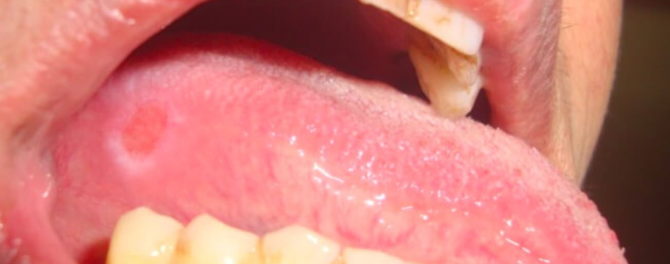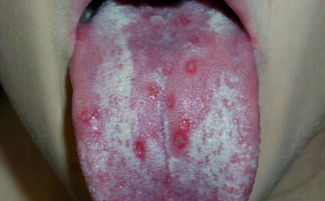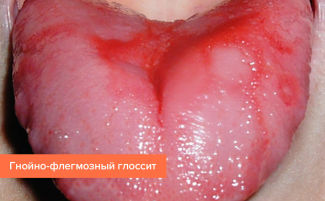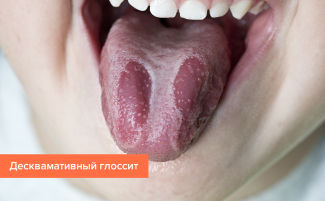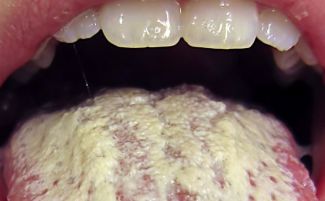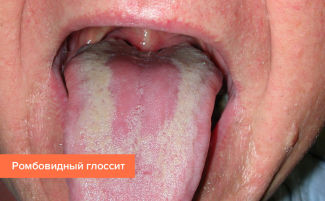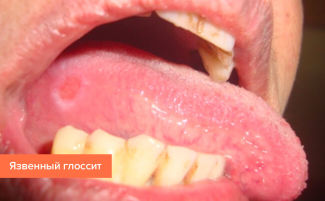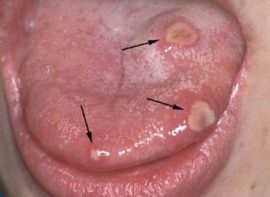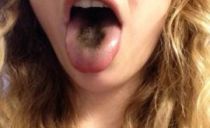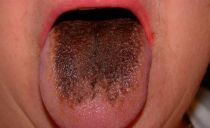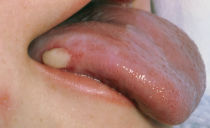Ulcers in the tongue: reasons why appear, how to treat
Mouth ulcers in children and adults can occur for a variety of reasons. They usually heal quickly on their own or after proper local treatment. But sometimes such wounds indicate the development of serious pathologies or systemic diseases, in which case they do not heal for a long time.
To get rid of ulcers in the tongue, it is necessary to treat not only the affected mucous membrane, but also the cause of the pathology. Therefore, the first thing you need to find out the nature of the occurrence of sores.
Content
Reasons why sores appear on the tongue
Tactics for treating ulcers in the tongue depend on the cause of their appearance. The most common cause leading to ulcers is mechanical trauma to the tongue., for example, when biting with teeth or cut with a cutlery. In addition, the formation of wounds leads to:
- burn too hot tea or coffee;
- hormonal changes during the menstrual cycle;
- diabetes;
- genetic predisposition;
- viral infections;
- lack of vitamin B12, iron and folate in the diet;
- the use of sodium lauryl sulfate toothpaste;
- complications of stomatitis or glossitis;
- coffee abuse;
- excessive alcohol consumption;
- smoking;
- constant refusal of breakfast;
- violation of diet and hygiene;
- heatstroke.
Infectious inflammation - glossitis
Almost always ulcers in the tongue indicate the development of glossitis - Varieties of stomatitis, infectious inflammation of the mucous membrane of the organ of taste. The disease can develop for any of the above reasons and is characterized by a variety of symptoms.
The photo shows sores in the tongue that occur with different forms of glossitis:
Taking medication
The cause of ulceration of the tongue may be taking medication. A similar side effect is characteristic of many drugs, but most often sores in the mouth appear with regular use of drugs with the following names:
- Nicorandil - used to treat heart disease.
- Indomethacin is a drug from the group of non-steroidal anti-inflammatory drugs.
- Phenytoin - is used to treat epileptic seizures.
- Cytostatic drugs (components of chemotherapy) - affect all rapidly dividing cells: both tumor and epithelial.
Ulcers in the tongue that arose due to taking medications require careful treatment, as they often turn into a chronic form and recur. It is advisable to stop taking medications, except in cases where the benefits of drug therapy exceed the severity of the consequences of its use. For example, with chemotherapy or other methods of treating cancer.
Chronic erosion can be associated with the abuse of drugs, which have a strong irritating effect on the mucous membrane of the tongue, which makes it crack and ulcerate.
Tongue ulcer
Usually people bite the tip of the tongue, so sores often form in this area. The lateral surface of the organ of taste is slightly less likely to suffer, and very rarely, the median.
Ulceration of the damaged part of the tongue indicates an infectious inflammation, which is possible only in the presence of pathogenic microorganisms in the mouth. Infectious agents can enter the wound through dirty cutlery or other objects, with insufficient oral hygiene, eating unwashed vegetables and fruits.
Sores caused by a person biting his tongue are painful and surrounded by erythema. Most often, such ulcers occur on the side of the tongue, they usually do not need to be treated - with proper oral hygiene, they heal on their own within a few days.
How to treat an ulcer due to a bite of the tongue
Treatment of ulcers caused by biting the tongue can be carried out with folk remedies at home. But if the ulcers do not heal within three weeks, you should consult a doctor to determine the exact diagnosis and exclude serious pathologies, for example, cancer.
To accelerate the healing process of wounds, local steroidal or non-steroidal anti-inflammatory drugs are used and medications are used that stimulate the regeneration of the epithelium and stop the symptoms of inflammation.
The appearance of ulcers with syphilis
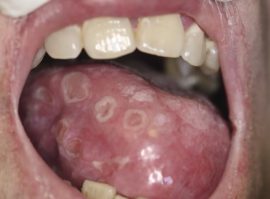 Another reason why sores appear on the tongue is syphilis. This is a very serious infectious disease that affects the skin, bone structures, internal organs, mucous membranes and even the nervous system. Wherever pathology appears, white sores are always present in the tongue. At the initial stage of syphilitic infection, they are painless and almost invisible. But as the inflammatory process worsens, the ulcers begin to hurt and increase, forming large erosions. They heal for a long time - several months.
Another reason why sores appear on the tongue is syphilis. This is a very serious infectious disease that affects the skin, bone structures, internal organs, mucous membranes and even the nervous system. Wherever pathology appears, white sores are always present in the tongue. At the initial stage of syphilitic infection, they are painless and almost invisible. But as the inflammatory process worsens, the ulcers begin to hurt and increase, forming large erosions. They heal for a long time - several months.
Erosion on the mucous membrane of the oral cavity is not the only sign of the development of syphilitic infection. Other symptoms of the disease include:
- Enlarged cervical lymph nodes.
- Plaque on the oral mucosa.
- Joining secondary infections - stomatitis, candidiasis.
- Partial loss of taste sensitivity.
Aft Bednara
Aft Bednara is a disease that affects mainly children under 1 year old. Ulcers form in the oral cavity due to excessive pressure from the nipple or bottle. They are covered with a gray-yellow, hard-to-remove coating. The mucous membrane around the aphthae is red and swollen. Because of the pain, the baby refuses a chest or bottle with an artificial mixture, is naughty.
Aftas of Bednar can be formed in children of preschool and school age due to the constant sucking of fingers, toys, pens.
Ulcerative necrotic gingivostomatitis
Ulcerative necrotic gingivostomatitis is an infectious disease characterized by the formation of ulcers on the gums, tongue, cheeks. It is accompanied by redness, swelling and bleeding of the gums, the formation of a yellow or greenish plaque on the mucous membrane of the oral cavity, bad breath, increased salivation.
With the advanced form of the disease, it is possible to increase body temperature to 38 ° C, the formation of ulcers, the deterioration of overall health. The disease requires competent comprehensive treatment.
Allergic reaction
If a sore pops out of the tongue without purulent contents, you should make sure that there is no allergic reaction to products and components of hygiene products.Numerous studies have established a direct relationship between aphthae in the oral cavity and sodium lauryl sulfate, which is added to toothpastes.
Sores in the oral cavity may appear due to a lack of certain nutrients: iron, folic acid, vitamin B12. Vitamin C also plays a role in ulcer formation, as it affects iron absorption.
Signs of ulcers and supporting symptoms
Sores can pop out from above, from the side and from the edge of the tongue. First, tiny red swellings (small blisters) form on the mucous membrane of the taste organ, after a day or two they burst and ulcerate. The resulting wounds are covered with a thin layer of white or yellow plaque and bordered by a red rim.
Aphthae can occur in people of different age groups. The frequency of the appearance of abscesses in the tongue is also different: in some, the pathology manifests itself once in a lifetime, in others - almost continuously.
On average, ulcers heal within two weeks, but without proper treatment, they can transform into pustules. The patient may complain of fever, loss of strength, discomfort and bad breath.
Sizes of pustules in the mouth
In the vast majority of cases, sores occur along the edges of the taste organ and have a small diameter - from 1 to 10 mm. They usually heal in 7–10 days. Sores located on the sides and center of the tongue can be classified as small in 80% of cases.
Large ulcers on the tongue can reach 1.5 cm in diameter and most often lead to the formation of scars. The healing of such sores is quite painful and can last up to 30 days.
When you urgently need to contact a specialist
You should immediately consult a doctor in such cases:
- When large ulcers, aphthae, tumors, foci of redness in the mouth occur.
- In the presence of severe pain, open wounds or discomfort with a feeling of fullness in the mouth.
- When wearing orthodontic structures and dentures.
- With bleeding from the focus of inflammation.
- If you experience weakness, malaise, anxiety, irritability, discomfort.
- With an increase in body temperature.
- With a rapid increase in ulcers.
- For headaches, a feeling of pressure in the mouth, or movement in the teeth.
Diagnostic measures
To identify the causes of the formation of ulcers in the tongue, the following examinations are carried out:
- general blood test that confirms or eliminates anemia;
- measuring a glycemic index that confirms or rules out diabetes;
- syphilis tests;
- Vitamin B deficiency tests, especially B12 and B3;
- smears for sowing;
- biochemical research.
Conservative and alternative treatment of tongue ulcers
Treatment of sores in the tongue is aimed at eliminating the causes of their occurrence, stopping symptoms and restoring the damaged mucous membrane. Ulcers formed due to a person biting his tongue can be treated with folk remedies made at home. You should rinse your mouth with a solution of baking soda or hydrogen peroxide, a decoction of sage or chamomile. Pain can be eliminated with the help of absorbable tablets with lidocaine.
If the cause of ulceration of the taste organ is infectious inflammation, treatment is carried out in the following order:
- With fungal stomatitis, the treatment of aphtha with antifungal ointments and gels is indicated. Adults can use the drug Nystatin.
- Viral etiology ulcers are treated with antiviral gels and ointments.
- If wounds with pus appeared on the tongue against the background of bacterial inflammation, antibacterial gels are used, for example, Tetracycline or Achromycin.
- For any inflammation, anti-inflammatory gels are prescribed. The main component of such preparations is usually fluocinonide or triamcinolone.
- To eliminate pain, local anesthetics are used, for example, a drug called Oragel.They should be applied directly to ulcers, this should be done several times a day.
- In order for the ulcers to heal quickly, and no scars form in their place, the mucous membrane of the tongue should be treated with gels and ointments that promote cell regeneration.
- It is necessary to rinse the oral cavity with pharmaceutical rinses daily. Mouthwashes can be made at home from chamomile, sage or nettle. If it hurts to rinse your mouth, it is permissible to wipe sores and festering scars with a cotton swab dipped in broth.
White ulcers on the tongue can indicate the development of a fungal infection, often accompanied by a violation of the intestinal microflora. Therefore, it is necessary to cleanse the intestines through the use of beets and restore its microflora by taking probiotics. Coconut oil will help speed up the healing of ulcerations on the tongue, covered with whitish pus and arising from a background of fungal inflammation. Wipe them with wounds and healthy areas of the organ of taste.
To get rid of ulcers on the root and tip of the tongue once and for all, it is necessary to increase immunity. You should include foods rich in nutrients in your diet and start taking vitamin-mineral complexes.
Small sores on the side of the tongue caused by biting, can be quickly cured with simple pharmacy glycerin. Rinse your mouth periodically with this product. It will help relieve pain, soften the surface of the tongue and accelerate its healing.
Mouth ulcers cause severe discomfort and complicate food intake. Most often, they pop up in the absence of oral hygiene. Therefore, with the frequent formation of aft in the tongue, you should pay close attention to the quality and regularity of brushing your teeth and gums.
Usually small sores heal after 7-10 days, but they hurt no more than 5 days. Large aphthae and pustules heal longer - up to several months.
What is fraught with the presence of ulcerative formations in the mouth
Aphthous erosion in the mouth can turn into an abscess. With this pathology, an abscess forms, similar to a callus and representing a cavity filled with liquid pus. Such a pathology can be cured only in a clinic setting.
An abscess can break through, as a result, bacteria enter the bloodstream. In this case, there is a high risk of blood poisoning and the spread of infection throughout the body. If purulent formations resembling corns appear on the oral mucosa, you should consult a doctor as soon as possible. If timely treated sores on the tongue, many serious complications can be avoided.
Disease prevention
To avoid ulceration of the mucous membrane of the tongue, it is worth adhering to the following rules of prevention:
- Do not eat hard and crumbling foods, such as potato chips, as they can worsen the condition of the wounds on the tip and root of the tongue.
- Be careful when brushing your teeth. Brush slowly and carefully.
- Refuse to eat fried, sour and spicy foods that irritate the oral mucosa.
- Use toothpastes without sodium lauryl sulfate.

